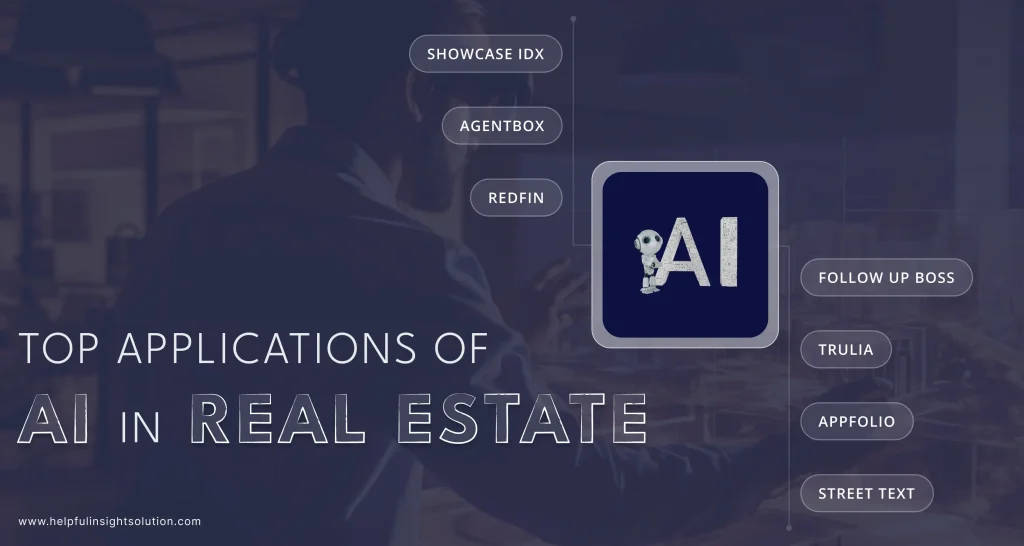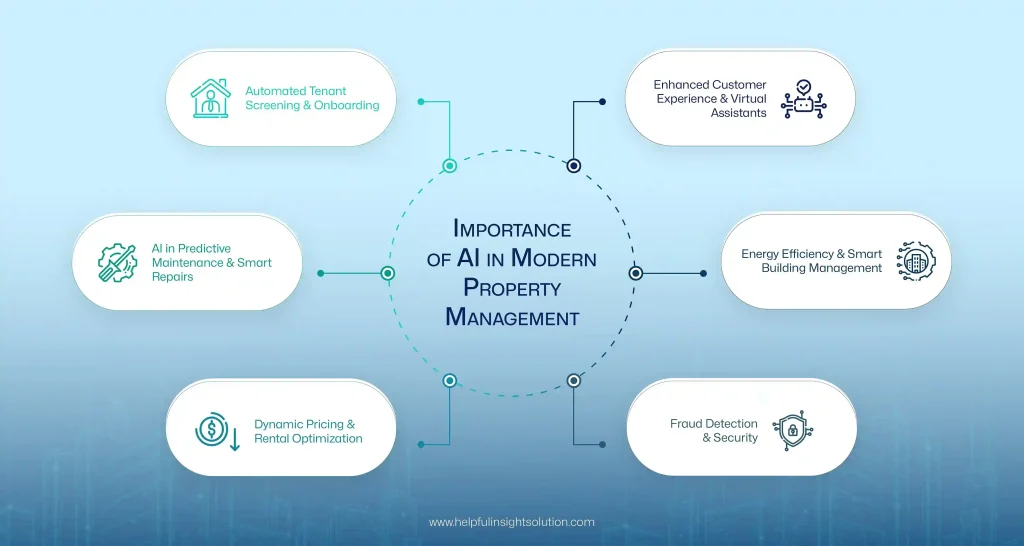AI is revolutionizing the real estate industry, streamlining processes for appraisers, mortgage lenders, developers, and homeowners. What was once a niche technology has become mainstream, driving efficiency, accuracy, and automation across the real estate marketplace.
Artificial intelligence is reshaping how real estate transactions are conducted, from AI-powered risk analytics and property valuations to personalized recommendations and automated customer interactions.
Real estate app developers leverage AI to optimize construction site selection, while realtors use it to enhance efficiency—though some argue it may reduce job opportunities.
To better understand impact of AI in real estate industry, let’s explore key examples of how companies are integrating this technology to drive innovation and transform the industry.
What Does AI In Real Estate Mean?
AI Application development is revolutionizing the real estate sector by integrating Artificial Intelligence in real estate to enhance decision-making, automate operations, and improve customer interactions.
AI app development companies leverage advanced algorithms to provide solutions for property valuation, predictive analytics, and tenant management, transforming how properties are bought, sold, and managed.
With the rise of AI app development, real estate businesses can optimize pricing strategies, streamline transactions, and offer AI-powered virtual assistants for 24/7 customer support.
Leading AI app developers are creating innovative platforms that use machine learning for market trend predictions, risk analysis, and property recommendations.
By adopting cutting-edge AI software development, the real estate industry is experiencing a significant shift towards automation, efficiency, and smarter investment decisions.
Why Must Businesses Invest In the Real Estate Industry?
- The market size in the Artificial Intelligence market is projected to reach US$347.05bn in 2026.
- The market size is expected to show an annual growth rate (CAGR 2026-2031) of 37.00%, resulting in a market volume of US$1.68tn by 2031.
- The Artificial Intelligence in Retail Market in the U.S. is projected to grow significantly, reaching an estimated value of USD 17.76 billion by 2031.
- With 61.1 billion dollars, the United States leads the globe in proptech investments.
- By 2025, AI is predicted to generate an additional 97 million jobs and remove 85 million current ones, according to the World Economic Forum.
Importance of AI in Modern Property Management
The next wave of the digital revolution—artificial intelligence (AI) and machine learning (ML)—is reshaping industries, including property management.
These technologies enable property management companies to streamline operations, enhance tenant experiences, and make data-driven decisions that lead to significant cost savings. AI also streamlines the integration of key features of the property management system in the app.
Predictive maintenance uses artificial intelligence algorithms to help property managers foresee when building systems or equipment may malfunction so they can fix them early and save more expensive downtime. Here we present some key benefits of using AI in property management.
1. Automated Tenant Screening & Onboarding
AI-powered screening tools analyze rental applications, credit histories, and behavioral patterns to identify the most reliable tenants, reducing risks and vacancies. To ensure effective and data-driven tenant selection, top AI app development companies include AI in predictive management to expedite onboarding.
2. AI in Predictive Maintenance & Smart Repairs
AI in predictive maintenance helps property managers anticipate failures, automate repairs, and minimize downtime. Leading app development companies are integrating AI to optimize property management, improving efficiency and tenant satisfaction.
3. Dynamic Pricing & Rental Optimization
AI in real estate enables dynamic pricing and rental optimization by analyzing market trends, demand fluctuations, and competitor pricing. Advanced AI algorithms provide data-driven insights to recommend optimal rental rates, ensuring maximum revenue while maintaining high occupancy.
4. Enhanced Customer Experience & Virtual Assistants
AI in property management enhances tenant interactions through AI chatbots and virtual assistants, offering 24/7 support for inquiries, maintenance scheduling, and personalized services. Top AI application development providers offer custom AI-powered solutions that ensure seamless and efficient property management, ultimately boosting tenant retention and operational efficiency.
5. Energy Efficiency & Smart Building Management
AI-powered smart systems optimize lighting, HVAC, and utilities by analyzing occupancy patterns in real-time, leading to reduced energy consumption and lower operational costs. Leading AI app development companies integrate these solutions to enhance sustainability and efficiency in property management.
6. Fraud Detection & Security
AI enhances security by analyzing surveillance footage, identifying unusual activities, and detecting fraudulent rental applications. Advanced AI in predictive management helps property managers safeguard tenants and assets with proactive threat detection and risk mitigation.
Challenges of Integrating AI in the Real Estate Industry
While there are many advantages to integrating artificial intelligence in the real estate sector, there are also a number of issues that need to be resolved. Here is a thorough rundown of these difficulties:
1. Security and Privacy of Data
Data privacy is a major problem because sensitive personal information is often included in real estate transactions. Adherence to laws such as the CCPA and GDPR can be difficult and resource-intensive.
To guard against cyberattacks and maintain client transparency about data usage, real estate companies need to have strong security measures in place, such as data encryption and safe access procedures.
2. High Implementation Costs
When incorporating AI into real estate solutions, a significant financial outlay may be necessary. Expenses include purchasing software, gathering and cleansing data, upgrading infrastructure, and continuing upkeep.
Although the long-term advantages, such as enhanced productivity and better customer service, can outweigh the initial investment, smaller businesses may find these expenditures exorbitant.
3. Technological Complexity
The technological understanding and expertise required to create and effectively administer AI systems are sometimes lacking in the real estate sector. It can be difficult to hire dedicated developers or teach current employees.
Furthermore, the adoption process may become more difficult if integrating AI with older systems necessitates major adjustments to present workflows.
4. Data Quality and Availability
AI-driven real estate solutions require high-quality and diverse data from sources such as public records, property listings, and market trends. However, incomplete or inaccurate data can lead to flawed AI predictions and analyses. Establishing strong data management practices is crucial, but it can be complex and resource-intensive.
5. Resistance to Change
Many real estate experts and agents may be hesitant to adopt AI due to concerns over job displacement or lack of familiarity with the technology. AI app development agencies must focus on user-friendly AI solutions and comprehensive training programs to help professionals embrace AI-driven real estate tools.
6. Legal and Regulatory Challenges
The evolving legal landscape of AI in real estate presents challenges, such as:
- Determining liability for AI-generated decisions in property valuations and transactions.
- Ensuring compliance with data protection regulations when using AI for tenant screening or pricing predictions.
- Navigating ethical concerns related to AI-driven decision-making.
Working with top AI development firms and legal experts is essential to ensure compliance with local and international regulations.
7. Integration Complexity
Integrating AI tools and technologies with existing app platforms can be time-consuming due to varying technological infrastructures across the industry. Organizations should prioritize building modular AI solutions that facilitate seamless integration, which can help accelerate the adoption of AI in real estate operations.
In summary, while AI has the potential to revolutionize the real estate industry by enhancing efficiency and decision-making, addressing these challenges is crucial for successful implementation. By focusing on data privacy, cost management, training, and legal compliance, real estate firms can better leverage AI technologies to improve their operations and services.
Read Also:- 10+ Best Real Estate Websites : Innovating the Future of Property Transactions
Top Applications of AI in Real Estate
If you’re looking for cutting-edge AI Real Estate Solutions, connect with our skilled AI developers for custom-built applications. Here are the top 10 AI-powered apps revolutionizing real estate in 2026:

Redfin: AI-Driven Home Search and Real Estate Market Insights.
Redfin integrates Artificial Intelligence with human expertise to deliver precise property valuations and personalized recommendations. This AI-driven approach enhances the home-buying experience by offering user-friendly interfaces and comprehensive market insights.
Trulia: AI-Powered Personalized Home Search Experience
Trulia utilizes AI to analyze user preferences and behavior, delivering customized property suggestions. The intuitive app interface allows users to search for homes based on specific criteria, improving their overall experience.
Agentbox: Intelligent CRM Solution for Real Estate Agents
A robust CRM solution designed specifically for real estate agents, Agentbox automates lead management, tracks performance, and enhances client communication. AI-powered automation helps agents stay organized and efficient.
Follow Up Boss: AI-Powered Lead Management & Nurturing Platform
This AI-powered app excels in lead nurturing with automatic lead management and integration with over 200 platforms. Follow Up Boss simplifies client communication by organizing all interactions in a single, easily accessible platform.
Showcase IDX: AI-Driven Real Estate Search & Lead Engagement Tool
Showcase IDX is an advanced IDX website plugin that automates property searches and improves lead engagement. It integrates real-time MLS data, providing clients with accurate property information and advanced search functionalities.
AppFolio: AI-Powered End-to-End Property Management Software
AppFolio is a comprehensive AI software development solution for property management. It automates leasing processes, tenant communications, and financial reporting while offering a tenant portal for seamless interactions.
StreetText: AI-Driven Lead Generation & Social Media Marketing for Realtors
StreetText uses AI to generate leads via social media platforms like Facebook and Instagram. The app simplifies campaign launches and enables automated communication with potential clients, boosting lead conversion rates.

Key Use Cases And Examples Of AI In Real Life
Implementing AI in the real estate industry offers numerous benefits, but it also presents several challenges that must be addressed to ensure successful integration. Here’s a detailed overview of these challenges:
1. Zillow
Zillow utilizes AI-driven machine learning algorithms to generate Zestimates, which provide real-time property value assessments based on extensive datasets, including historical pricing trends, location factors, and home features. AI also helps improve its iBuying service offered by Zillow, by making more accurate home price predictions.
Use Case: Zillow’s Zestimate leverages AI and machine learning to analyze:
- Market trends
- Property characteristics
- Comparable sales data
- User-submitted home improvements
If you’re interested in knowing more about real estate giant like Zillow, or a business wanting to launch a worthy Zillow competitor in the app development market, then refer to:
Explore More: Top 10 Apps like Zillow | Best Real Estate Apps
2. Redfin
Redfin employs AI to enhance automated property valuations, combining big data analysis with human expertise for improved pricing accuracy. AI in real estate apps also powers its recommendation engine, helping buyers find homes tailored to their preferences. Redfin’s AI-enhanced Redfin Estimate tool provides real-time updates on property values by analyzing market trends.
Use Case: Ility integrates AI and IoT to:
- Optimize energy efficiency in buildings
- Automate HVAC, lighting, and security
- Enable predictive maintenance to reduce costs
3. Trulia
Trulia’s AI capabilities focus on offering personalized property recommendations by analyzing user search behavior, location preferences, and home features. The AI application platform also uses AI-powered computer vision to extract insights from property photos, helping users make informed decisions.
Use Case: Redfin employs AI for:
- Automated home valuation using real-time market data
- Dynamic pricing models for accurate property listings
- AI-driven recommendations for home buyers and sellers
4. Ility
Ility is a SaaS platform that integrates AI and IoT to help commercial property owners manage multi-property portfolios more efficiently. AI-driven insights allow Real estate property managers to optimize energy usage, track occupancy trends, and automate maintenance workflows, improving operational efficiency and cost savings.
Use Case: Trulia really uses AI to:
- Analyze user behavior and preferences
- Provide personalized property recommendations
- Enhance search accuracy with AI-driven filters
How has AI revolutionized the real estate industry?
AI is significantly transforming the real estate industry by enhancing efficiency, improving customer experiences, and driving data-driven decision-making. App development organizations continue to innovate AI solutions that reshape how properties are bought, sold, and managed. Here are the key roles AI plays in this sector:
1. Optimizing Property Searches
Artificial intelligence in real estate has revolutionized property search processes by analyzing user preferences and behaviors. Unlike traditional search filters, AI-driven platforms personalize recommendations based on past interactions, allowing buyers to find properties more efficiently and accurately.
2. Predicting Market Trends
AI employs predictive analytics to assess historical and current data, helping real estate experts forecast future property values and market trends. AI in the real estate sector enables investors to make well-informed decisions and identify high-growth areas.
3. Automating Property Valuation
Top AI application development providers have introduced AI-powered valuation models that quickly analyze large datasets, including market trends and property features. These AI-driven systems minimize human error and provide real-time valuation insights for buyers and sellers.
4. Enhancing Property Management
AI simplifies property management tasks by automating rent collection, maintenance scheduling, and tenant communications. Aspiring AI app developers integrate cutting-edge AI solutions to improve operational efficiency, reducing manual workload and improving tenant experiences.
5. Improving Customer Service
AI-powered chatbots and virtual assistants enhance customer service by handling inquiries, providing property details, scheduling viewings, and offering personalized recommendations, streamlining the entire home-buying experience.
6. Advanced Data Analytics
AI-driven data analytics enable real estate professionals to gain valuable insights into pricing fluctuations, investment opportunities, and consumer behaviors. Artificial intelligence app development firms provide solutions that empower real estate businesses with actionable intelligence.
7. Personalization of Listings
AI platforms use machine learning to tailor property listings to individual preferences. AI in real estate ensures potential buyers receive recommendations that align with their needs, enhancing user engagement and satisfaction.
8. Streamlining Transactions
Top AI development company leverage AI to automate real estate transactions, reducing paperwork, standardizing data, and minimizing errors, ensuring a faster and more secure process for buyers and sellers.
9. Supporting Virtual Experiences
AI-driven virtual tours and augmented reality applications have transformed property viewing, allowing buyers to explore homes remotely. AI in the real estate sector is making property assessments more convenient and efficient.
From predictive analytics to AI-powered property management, artificial intelligence technologies continue to reshape the real estate landscape. AI app development companies are at the forefront of this transformation, providing innovative solutions that optimize business operations and elevate customer experiences.

Team up with Helpful Insight to build custom AI Real Estate Solutions
Helpful Insight is a top AI app development provider specializing in artificial intelligence technologies to create innovative real estate applications.
Whether you’re a real estate expert looking to enhance property management or a business aiming to streamline property transactions, Helpful Insight provides cutting-edge solutions tailored to your needs.
Leveraging AI in the real estate industry, Helpful Insight develops intelligent valuation models that assess market conditions, location data, and property attributes. This helps users make data-driven investment decisions with accurate price predictions.
You can trust Helpful Insight for:
- Expertise in AI-driven real estate solutions
- Customized & scalable applications
- Seamless integration of AI & automation
- Cutting-edge AR/VR technology for property viewing
- Secure and transparent transactions
With Helpful Insight’s AI app development services, you can redefine the real estate industry by leveraging AI to enhance property discovery, streamline operations, and improve customer experiences. As AI continues to evolve,
The real estate industry will see further automation, efficiency, and personalization, making property transactions faster, smarter, and more accessible.
If you want to learn more about how Real app developers streamline app development through AI and machine learning, then refer to Helpful Insight’s real estate app development page and get valuable insight on the matter.
Moreover, partnering with top AI development firms like Helpful Insight ensures that real estate businesses stay ahead of the curve and maximize the potential of AI in real estate.
FAQs
Ans. To combat resistance from real estate agents who may fear job loss or are unfamiliar with technology, companies should invest in training programs that demonstrate the benefits of AI tools and how they can enhance job performance.
Ans. The integration of AI in Mobile applications is expected to continue evolving, intersecting with emerging technologies such as blockchain and IoT. This will lead to more innovative solutions for property transactions, enhanced security measures, and immersive virtual experiences.
Ans. Several AI app development companies are at the forefront of integrating AI into real estate:
- Zillow: Known for its Zestimates using predictive analytics.
- Redfin: Combines human expertise with AI for accurate valuations.
- Ility: A SaaS platform that integrates AI for effective multi-property management.
Ans. Companies looking to implement AI should connect with skilled AI developers or partner with a reputable real estate app development company. These experts can help design tailored solutions that meet specific business needs while ensuring compliance with regulations.
Ans. As the market evolves rapidly due to technological advancements, staying informed about the latest trends in AI software development is essential for businesses aiming to maintain a competitive edge and optimize their operations.










